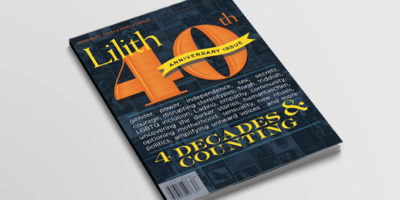A Rabbi’s Take on an Agnostic’s Apologia
Doubt and Dialogue
Can one be Jewish and agnostic? This paradox opens the stunning new book by Lesley Hazleton, Agnostic: A Spirited Manifesto (Riverhead Books, $13.99). In luminous and readable prose, Hazleton tackles the sticky questions of our faith-focused age: what does it mean to doubt, to be unsure of one’s belief in a higher power? Her meandering responses will fascinate the religious and the secular reader alike.
A celebrated journalist, Hazleton is noted for her work on Mideast politics. This book focuses on the subject of her more intimate blog, The Accidental Theologian, where personal anecdotes lead to incisive discussion of belief. She characterizes agnosticism as “free-spirited, thoughtful, and independent-minded,” defined by a willingness to investigate many of the deeper complexities around divinity and faith prohibited both by strict orthodoxy and by doctrinaire atheism. Thematic sections discuss the anthropomorphic limiting of God; the relationship between doubt and faith; mystery and the infinite; mortality, afterlife and the soul. What keeps these heady topics accessible is Hazleton’s lively prose and the accounts of her personal journey, as in this retelling of hiking a Northwest mountain. “Each time I looked back, the mountain seemed more threatening, filling me with the visceral sense of an infinitely powerful presence—not of a divine being, but of an implacable, unthinking, inhuman force that was very much of this world, in which my existence, this individual human life, was utterly irrelevant.” Hazleton engages with the wealth of scholarship on this topic but does not let it derail her: her work is that rare work of philosophy both profound and clear.
As a rabbi in this postmodern age, I occasionally saw Hazleton’s manifesto positing a straw man of religious dogmatism that doesn’t quite fit with contemporary Judaism’s comfort with multiple models of divinity. While she identifies as Jewish on the very first page, many of her frameworks seem to be drawn from a Christian perspective on faith, such as having a religious requirement to believe in a God both omnipotent and personal. Ambivalence about the Divine is rife in modern liberal Judaism (although we do pray to “Our Father, Our King” on the High Holidays). The sections of Agnostic that most spoke to me were on doubt and faith. “Where belief is the easy way out, a comfortable position for pious couch potatoes, faith demands an active engagement with uncertainty.” This book both comforted me by echoing my own internal questions and challenged me to engage in more active self-reflection: what do I really believe, and how can I live in accord with this theology?
Hazleton’s captivating book is about how to live deeply and honestly. I highly recommend it to the pious, the doubting, and the religious seeker.
Rabbi Sara N. S. Meirowitz is Assistant Department Chair of Jewish Studies at Gann Academy in Waltham, MA.


